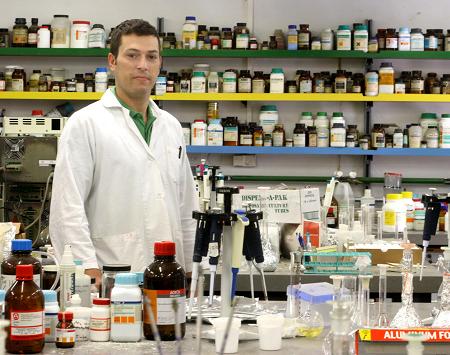The innovative method developed by Goldstein is designed to increase the effectiveness of prostate cancer treatment, when it is in an advanced stage and sends metastases to the body
Danny Goldstein. Photo: Sasson Thiram, courtesy of the Hebrew University
A doctoral student at the School of Pharmacy of the Faculty of Medicine at the Hebrew University has developed a method to prevent the spread of prostate cancer cells. The student Danny Goldstein carried out his research under the guidance of Prof. Shimon Benita. For the development, he recently received the Bernholtz Award for creativity and originality in applied science as part of the 70th session of the Board of Trustees of the Hebrew University.
Prostate cancer is the second leading cause of cancer death in American men. The innovative method developed by Goldstein is designed to increase the effectiveness of prostate cancer treatment, when it is in an advanced stage and sends metastases to the body. Acceptable methods for treating prostate cancer - in an advanced stage of development - include a combined treatment of chemotherapy and radiotherapy and are often accompanied by serious side effects that also damage healthy cells in the patient's body.
In many cases, the spread of cancer cells is accompanied by overexpression of proteins (receptors) on the cell wall. Today's innovative drugs for the treatment of cancer, of its various types, make use of antibodies that recognize the receptors found on the cell wall of the patient's body, and often succeed in destroying the cancer cells without harming the healthy neighboring cells. However, treatment with antibodies is not enough and must be combined with chemotherapy, which causes severe side effects.
Goldstein's research applied a new concept to the treatment of prostate cancer, which is the attachment of antibodies to oil drops of an emulsion containing an anti-cancer drug. In this way, the drug-loaded oil droplets are "homed" to the cancer cells that the antibody recognizes and cause the drug to be released near the infected target tissues. Goldstein was able to bind specific antibodies to the HER2 protein (found in particularly high amounts in prostate cancer cells) to the emulsion loaded with a fatty derivative of the commercial anti-cancer drug Taxol.
The first laboratory experiments that tested the effectiveness of the method he developed were successfully completed. In mice that were injected with human prostate cancer cells, there was a delay in the development of the tumor and they did not suffer any side effects, while in the control group a rapid growth of the cancer cells was observed.
"The results of the experiment have encouraging potential for the treatment of prostate cancer, as they create an opportunity for future studies that will apply this technique to other types of cancer as well," says Goldstein. "However, it must be remembered that the results of the study are not absolute and although for now they are positive, additional studies are required that will contribute to the understanding of prostate cancer treatment."
Research supervisor Prof. Shimon Benita from the School of Pharmacy at the Hebrew University estimates that it will take about two more years until the clinical trials stage.


5 תגובות
Peace
Where can I find the original article?
Thanks
Grade
Response to mentor: In addition.
And I must quote a wise man who said" "Oh, you have cancer? If you're a mouse, we'll surely cure you!"
That is, according to what I understand, the scientist uses an existing drug but kills the cancer with an oil that sticks to the antibodies and the cancer cells (and this instead of or in addition to the usual killers in the existing drug)?
Well done!
Well done, news that warms the heart.